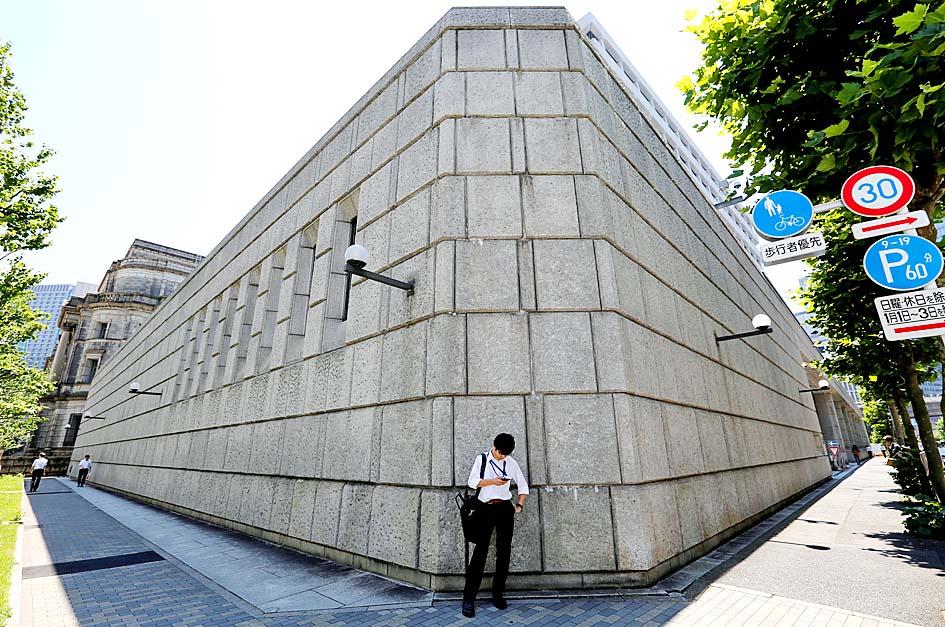The COVID-19 pandemic has encouraged more cash-loving Japanese to move away from banknotes and coins, giving a boost for banks in their drive toward digitalization, the industry’s lobby group chief said.
“A trend toward cashless payments, which so far progressed gradually, has picked up speed during the pandemic,” Kanetsugu Mike, chairman of the Japanese Bankers Association, said at a news briefing on Thursday. “The banking industry would like to actively work toward going cashless.”
Japan has long been known for its heavy use of cash, which is a burden for banks that are trying to shift more routine, unprofitable tasks to digital channels. Maintaining ATMs alone costs about ¥700 billion (US$6.64 billion) annually and another ¥100 billion is spent handling cash at branch counters, Nomura Research Institute said.

Photo: Reuters
The pandemic has added an incentive for consumers and merchants to avoid touching physical money.
As well as reducing costs, cashless payments could help to spur innovations in areas such as the use of transaction data, said Mike, who is also CEO of Mitsubishi UFJ Financial Group Inc’s main banking unit.
Banks are trying to expand cash-free locations so employees can focus on more lucrative services such as offering investment advice to clients.
Aozora Bank Ltd stopped dealing with notes and coins at its branches last month, though customers can still use ATMs. Lenders including MUFG are also phasing out other laborious physical items such as passbooks and personal seals.
The government has set a goal of increasing cashless payments to about 40 percent of all transactions by 2025, from about 20 percent. More Japanese are using credit cards and electronic money for small purchases, according to a survey by the Central Council for Financial Services Information.
Still, people continue to hoard the largest banknotes. Japan’s ¥10,000 bills in circulation rose 6.4 percent last month from a year earlier, Bank of Japan data showed.
That is because the country’s rock-bottom interest rates have reduced the incentive to put money in banks, said Tsuyoshi Ueno, senior economist at NLI Research Institute.

Sweeping policy changes under US Secretary of Health and Human Services Robert F. Kennedy Jr are having a chilling effect on vaccine makers as anti-vaccine rhetoric has turned into concrete changes in inoculation schedules and recommendations, investors and executives said. The administration of US President Donald Trump has in the past year upended vaccine recommendations, with the country last month ending its longstanding guidance that all children receive inoculations against flu, hepatitis A and other diseases. The unprecedented changes have led to diminished vaccine usage, hurt the investment case for some biotechs, and created a drag that would likely dent revenues and

Macronix International Co (旺宏), the world’s biggest NOR flash memory supplier, yesterday said it would spend NT$22 billion (US$699.1 million) on capacity expansion this year to increase its production of mid-to-low-density memory chips as the world’s major memorychip suppliers are phasing out the market. The company said its planned capital expenditures are about 11 times higher than the NT$1.8 billion it spent on new facilities and equipment last year. A majority of this year’s outlay would be allocated to step up capacity of multi-level cell (MLC) NAND flash memory chips, which are used in embedded multimedia cards (eMMC), a managed

CULPRITS: Factors that affected the slip included falling global crude oil prices, wait-and-see consumer attitudes due to US tariffs and a different Lunar New Year holiday schedule Taiwan’s retail sales ended a nine-year growth streak last year, slipping 0.2 percent from a year earlier as uncertainty over US tariff policies affected demand for durable goods, data released on Friday by the Ministry of Economic Affairs showed. Last year’s retail sales totaled NT$4.84 trillion (US$153.27 billion), down about NT$9.5 billion, or 0.2 percent, from 2024. Despite the decline, the figure was still the second-highest annual sales total on record. Ministry statistics department deputy head Chen Yu-fang (陳玉芳) said sales of cars, motorcycles and related products, which accounted for 17.4 percent of total retail rales last year, fell NT$68.1 billion, or

In the wake of strong global demand for AI applications, Taiwan’s export-oriented economy accelerated with the composite index of economic indicators flashing the first “red” light in December for one year, indicating the economy is in booming mode, the National Development Council (NDC) said yesterday. Moreover, the index of leading indicators, which gauges the potential state of the economy over the next six months, also moved higher in December amid growing optimism over the outlook, the NDC said. In December, the index of economic indicators rose one point from a month earlier to 38, at the lower end of the “red” light.